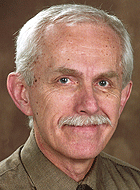Three University scientists are among the 72 members and 18 foreign associates recently elected to the National Academy of Sciences (NAS). Election to the academy is considered one of the highest honors accorded a U.S. scientist or engineer.
WUSTL’s new academy members are Clifford M. Will, Ph.D., the James S. McDonnell Professor of Physics in Arts & Sciences; Wayne M. Yokoyama, M.D., the Sam J. Levin and Audrey Loew Levin Chair for Research of Arthritis and professor of medicine and of pathology and immunology; and Aaron J. Ciechanover, M.D., D.Sc., visiting professor of pediatrics at the School of Medicine and the Research Distinguished Professor of Biochemistry at Technion – Israel Institute of Technology.
“It is an incredible honor for Washington University to have these three impressive scientists inducted into the National Academy of Sciences,” Chancellor Mark S. Wrighton said. “Professors Will, Yokoyama and Ciechanover are extremely deserving of this recognition. Washington University continues to be an international leader in scientific research and innovation due to the efforts of scholars such as Dr. Will, Dr. Yokoyama and Dr. Ciechanover.”
Will is a theoretical physicist whose research interests encompass the observational and astrophysical implications of Einstein’s general theory of relativity, including gravitational radiation, black holes, cosmology, the physics of curved spacetime and the interpretation of experimental tests of general relativity.

Will earned a bachelor’s degree in applied mathematics and theoretical physics in 1968 from McMaster University and a doctorate in physics from California Institute of Technology in 1971.
Will joined WUSTL’s physics faculty in 1981 and is a member of the McDonnell Center for the Space Sciences in Arts & Sciences.
Will’s “Was Einstein Right?” (1986) won the American Institute of Physics Science Writing Award.
His “Theory and Experiment in Gravitational Physics” (1981) is considered the bible of the field.
A fellow of the American Academy of Arts & Sciences and of the American Physical Society, Will was named a J. William Fulbright Fellow and a John Simon Guggenheim Fellow in 1996-97.
A frequently invited lecturer worldwide, Will is serving a three-year term as president of the International Society on General Relativity and Gravitation.
Yokoyama‘s research has helped show how various mechanisms license, restrain and unleash natural killer (NK) cells.

Previously, scientists had conceptualized the immune system’s method for recognizing invaders as comparable to issuing an all-points bulletin: An alert went out, and immune system cells searched for and attacked the invader.
NK cells opened a new possibility that NK cells were checking the molecular “credentials” of everything they encountered and could attack if the proper identification wasn’t forthcoming. In 1992, Yokoyama’s lab was the first to identify a receptor on the surface of NK cells that enabled this process by inhibiting NK cell function when it recognizes major histocompatibility complex class I molecules. Normally present on the surface of cells, these molecules often are absent on tumors and virus-infected cells, allowing the NK cell to attack the abnormal cells.
Yokoyama, who also is a Howard Hughes Medical Institute investigator, chief of the Division of Rheumatology and director of the Center for Arthritis and Related Diseases, was the 2001 recipient of the Novartis Prize for Basic Immunology. He earned a medical degree at the University of Hawaii at Manoa. He came to the University in 1995.

Ciechanover was a co-recipient of the 2004 Nobel Prize in Chemistry for his contributions to the discovery and description of a process cells use to discard unwanted proteins.
Eliminating faulty and unnecessary proteins helps cells maintain protein quality and is essential for the cell cycle, DNA repair, gene transcription and some immune functions.
Ciechanover has been a visiting professor at the University since 1987. Last year, the University presented him with an honorary doctor of science degree.
Ciechanover will be a foreign associate of the NAS.